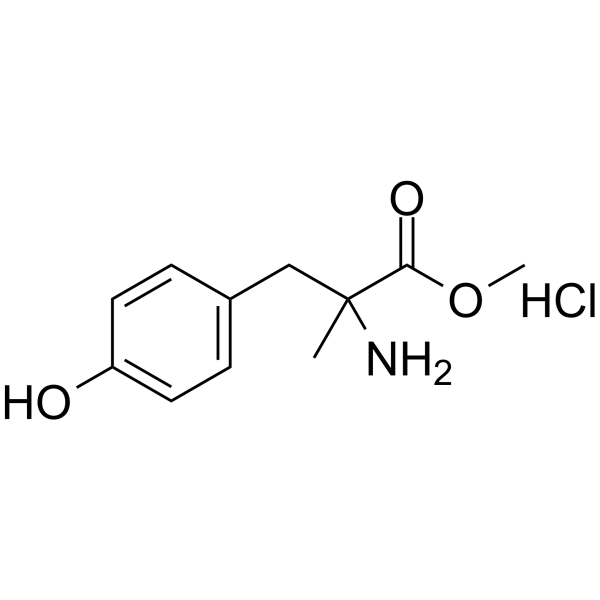alpha-methyl-dl-tyrosine methyl ester hydrochloride

alpha-methyl-dl-tyrosine methyl ester hydrochloride structure
|
Common Name | alpha-methyl-dl-tyrosine methyl ester hydrochloride | ||
|---|---|---|---|---|
| CAS Number | 7361-31-1 | Molecular Weight | 245.70300 | |
| Density | N/A | Boiling Point | 336.4ºC at 760 mmHg | |
| Molecular Formula | C11H16ClNO3 | Melting Point | 192 °C (dec.)(lit.) | |
| MSDS | USA | Flash Point | 157.2ºC | |
Use of alpha-methyl-dl-tyrosine methyl ester hydrochlorideα-Methyltyrosine methyl ester hydrochloride is a competitive tyrosine hydroxylase inhibitor that inhibits the conversion of tyrosine to dopamine. α-Methyltyrosine methyl ester hydrochloride can be used as a tool for sympathetic nervous system research[1]. |
| Name | methyl 2-amino-3-(4-hydroxyphenyl)-2-methylpropanoate,hydrochloride |
|---|---|
| Synonym | More Synonyms |
| Description | α-Methyltyrosine methyl ester hydrochloride is a competitive tyrosine hydroxylase inhibitor that inhibits the conversion of tyrosine to dopamine. α-Methyltyrosine methyl ester hydrochloride can be used as a tool for sympathetic nervous system research[1]. |
|---|---|
| Related Catalog | |
| References |
| Boiling Point | 336.4ºC at 760 mmHg |
|---|---|
| Melting Point | 192 °C (dec.)(lit.) |
| Molecular Formula | C11H16ClNO3 |
| Molecular Weight | 245.70300 |
| Flash Point | 157.2ºC |
| Exact Mass | 245.08200 |
| PSA | 72.55000 |
| LogP | 2.32740 |
| Storage condition | −20°C |
| Water Solubility | H2O: 50 mg/mL, clear, faintly yellow |
CHEMICAL IDENTIFICATION
HEALTH HAZARD DATAACUTE TOXICITY DATA
|
| Personal Protective Equipment | Eyeshields;Gloves;type N95 (US);type P1 (EN143) respirator filter |
|---|---|
| Safety Phrases | S22-S24/25 |
| RIDADR | NONH for all modes of transport |
| WGK Germany | 3 |
| RTECS | YP2900000 |
| HS Code | 2922509090 |
| HS Code | 2922509090 |
|---|---|
| Summary | 2922509090. other amino-alcohol-phenols, amino-acid-phenols and other amino-compounds with oxygen function. VAT:17.0%. Tax rebate rate:13.0%. . MFN tariff:6.5%. General tariff:30.0% |
|
Chemical genetics reveals a complex functional ground state of neural stem cells.
Nat. Chem. Biol. 3(5) , 268-273, (2007) The identification of self-renewing and multipotent neural stem cells (NSCs) in the mammalian brain holds promise for the treatment of neurological diseases and has yielded new insight into brain canc... |
|
|
Genetic mapping of targets mediating differential chemical phenotypes in Plasmodium falciparum.
Nat. Chem. Biol. 5 , 765-71, (2009) Studies of gene function and molecular mechanisms in Plasmodium falciparum are hampered by difficulties in characterizing and measuring phenotypic differences between individual parasites. We screened... |
|
|
Evidence in locomotion test for the functional heterogeneity of ORL-1 receptors.
Br. J. Pharmacol. 141(1) , 132-40, (2004) 1. The ORL1 agonists nociceptin and Ro 64-6198 were compared in their ability to modify spontaneous locomotor activity in male NMRI mice not habituated to the test environment. 2. Higher doses of noci... |
| MFCD00012606 |
| EINECS 230-900-0 |
| AMPT |
| 2-Methyl-4-hydroxy-DL-phenylalanine methyl ester hydrochloride |